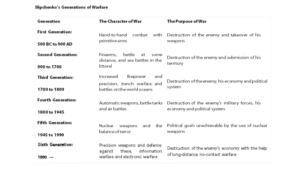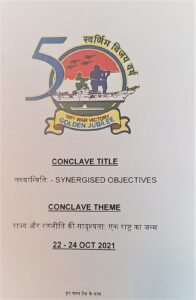Link : https://fb.watch/9fxX7_M1QD/
Suggestions and value additions are most welcome
For regular updates, please register here
Link : https://fb.watch/9fxX7_M1QD/
Suggestions and value additions are most welcome
For regular updates, please register here
While researching for “future of warfare”, I came across an interesting article about classification of wars over the years into generations.
These thoughts are of Russian military theorists Major General Vladimir Slipchenko (1935–2005). General Slipchenko is considered as one of the leading thinkers on “non-contact” and “sixth-generation” warfare.
Slipchenko’s while examining warfare, classifies warfare into six generations.
Slipchenko’s Generations of Warfare

(Source: Vladimir Slipchenko, Voiny Novogo Pokolenia – Distantsionnye i Bezkontaktnye (Moscow: Olma-Press, 2004), pp. 32– 34.
No Contact Warfare. Slipchenko ties the idea of sixth-generation warfare to a concept of non-contact or contactless warfare. He conveys the idea that future war between modern states will take place without direct contact.
Future Warfare. Slipchenko outlined wars of the future as follows:
Seventh-Generation Warfare: Info Warfare
Slipchenko also worked on the concept of a future “seventh generation” of warfare, which he forecast could emerge in the 2050s among the most advanced military powers. Numerous aspects of this work, especially in relation to the exponential growth in the importance of information in modern and future warfare are already percolating into the modern day warfare.
Slipchenko ahead of his time highlighted the importance of cyber along with information in the future battle space, and also forecast this area emerging as a separate combat arm. He identifies the centrality of information in modern and future warfare, forecasting that its utility would eventually move beyond a combat support role and into the area of essentially a combat arm.
Slipchenko identified information as a future weapon in war similar to the destructive effect of kinetic systems, and suggested that this would influence war in its entirety from beginning to conflict termination. He estimated that info warfare will transform warfare beyond the strategic level to reach truly global scales.
According to Slipchenko, information superiority would be the key to gaining superiority in non-contact warfare. Domination would be required in the information domain of space systems as well as reconnaissance, warning, navigation, meteorological, command and control, and communications assets.
Information Confrontation. Slipchenko argued that the information confrontation demands continuous exploitation as compared to information warfare during a skirmish. Possibly hinting at exploitation of info warfare even in no war conditions (Present day Grey Zone).
Comments
Slipchenko’s Thoughts and predictions are coming true, that too ahead of expected timelines.
Information has become a new domain for warfare.
Information warfare is not in isolation but getting linked with other domains of cyber, space and electronics.
A new service is evolving to deal with this type of warfare (e.g. Chinese Joint Strategic Support Force).
This warfare is being exploited in a conflict scenario, without declaring open war i.e. Grey Zone warfare.
Additional Thought
Seventh or eighth generation warfare is also developing in another direction in parallel. The kinetic or contact warfare being fought by unmanned machines (or a combination of manned and unmanned machines). These machines will have a very high computing power, will be AI enabled and will work in a networked environment.
Random Observations
Sci-Fi movies become reality sooner or later.
Question
What are your views about the direction in which warfare is progressing ?
Suggestions and value additions are most welcome
For regular updates, please register here
References
https://jamestown.org/program/russian-sixth-generation-warfare-and-recent-developments/




Participated in the Seminar on 1971 War.
Empaneled along with Distinguished Diplomats Shri G Parthasarathy and Shri Shivshankar Menon.
Spoke on the subject “Multilateralism and Flexible Security Scenario.
Link to the talk:- Multilateralism: Flexible Security Cooperation
Suggestions and value additions are most welcome
For regular updates, please register here